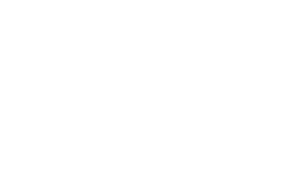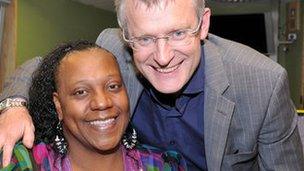'Hackney Heroine' and others talk of impact of riots
- Published

Siva Kandiah was shocked to see the damage caused to his shop during the riots last August
For one week in August last year, millions were shocked as homes and shops across London and other parts of England were looted and burnt to the ground.
Siva Kandiah was at home watching live coverage of the riots when, to his horror, he saw his shop in Hackney being destroyed.
Unable to get through to the police or to get to the shop, Mr Kandiah, a father of two young girls, could only watch on as his business was open to looting.
It was the only business on his road that was destroyed - mainly because it contained alcohol and cigarettes.
"Everybody liked us - when you serve people they like you, so I have never had any problems," he said, adding that although he believed most of the rioters were local, he did not want to know who they were.
When he first entered his shop the following day, he thought it was the end of retailing for him, but the local community gathered round and said: "You're not going anywhere, we're going to help you back."
Plenty of people offered to help - for free - with repairing the store. One woman even gave him her pension.
"A lot of people need you... it just changes your life and you can't walk away," he said.
Within a week, he was selling to people outside the shop and a month later it was re-fitted and open for business.
Despite this, the damage has cost him almost £85,000.
"It's the saddest thing in your life... (but) at least I'm trading, that's the best ever thing as otherwise I'd be jobless and homeless on the street."
It was not just the local community who helped.
The campaign to get his shop reopened was launched some 3,500 miles (5,600 km) away in New York.
Mark Pytik, a former Hackney resident, used to visit the shop several times a week when he lived there a couple of years ago with his girlfriend.
A website he set up calling for donations for Mr Kandiah raised £30,000.
"The motivation to set up the site came from a general feeling of helplessness that stemmed from seeing our old neighbourhood at the centre of the riots when we were halfway across the world," Mr Pytik said.
"This felt like the most constructive thing we could do from so far away."
Another person who was directly affected by the riots is Charlene Munro, a mother-of-one whose Croydon flat was burnt down.
She said it had been hard for her now four-year-old son to deal with what had happened, particularly as they were in the flat when the music shop next door was set alight.
Having managed to escape, they were then surrounded by about 150 rioters, including one wielding a machete.
Now, six months on, her main worry is the impact on her son.
"I know there's a fear, but I don't know how much," she said.
"I don't know how it's affected him; how he'll react if he sees a large crowd or something burning."
'Is this really me?'
Pauline Pearce became the voice of the outrage against the rioters when a video of her shouting at people who were destroying Hackney was posted on You Tube.
In it, she said: "This is about a man who got shot in Tottenham, it isn't about having some fun and busting up the place.
"I'm ashamed to be a Hackney person because we're not all gathering together and fighting for a cause. We're running down to Footlocker and thievin' shoes."
Now known as the "Hackney Heroine", Ms Pearce's life has been transformed.

Pauline Pearce has often talked about the riots' impact, including in an interview with Jeremy Vine
A long-time campaigner against gang violence after her son was stabbed, since the riots she has been invited to speak at various functions and has become a focal point for the community.
She said: "Hark at the heroine! All my friends tease me rotten but I mean, what a title - it's such a 'wow' one.
"I should have a Batman cape with HH written on it - you'll see me spinning me around in a phone box. It's kind of a title I hope I live up to."
She added: "Who would have guessed that my cussing would have ended up like this? It's surreal. Some days I wake up and think 'is this really me?'"
Because she lost a property in a house fire and served time in jail for drugs smuggling some years ago, she said she could relate to what people on both sides were going through.
"When people give up, that's when they start doing drugs and desperate things and this is the awareness I'm trying to bring to the PM and other heads.
"If you're going to revolt, do it in the right way; that's all I wanted.
"Our country has got selfish and it's sad and that's why I'm trying to talk and spread a little bit of love and maybe some love will come."
Since the riots, Ms Pearce has been busy organising community events, including a reggae Christmas party, but her dream is to run a community centre.
"Let's stop talking and do something to make a change. You'd be surprised by the amount of people who want to make a change."
And on the six month anniversary, Darra Singh, Chair of the Riots Communities and Victims Panel, said the deadline for people who had been affected to get in touch had been extended to 1 March.
"We heard many stories of personal courage and resilience from our visits to riot affected areas across London," he said.
"In advance of our final report in March, we want to know how all victims of the riots are getting on.
"We are a panel for the people - so please get in touch."